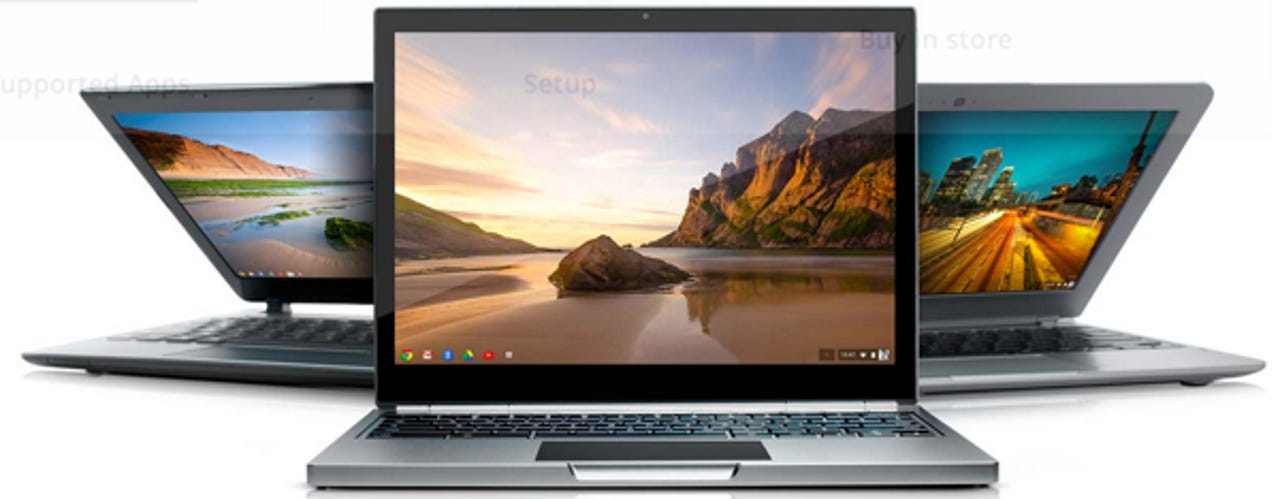The murky path forward for Chromebooks


It took a few years but sales of Chromebooks are now growing at a fast clip. The low-cost laptops running Chrome OS are not selling in numbers to challenge the big boys, but they are doing pretty well considering it's a relatively new platform.
Sales are especially good in the education sector where the Chromebook is a good fit. No question Google and partners will keep pitching the laptops to schools.
Featured
With things going well for Chromebooks, it won't serve Google well to be satisfied with the status quo. Getting Chrome OS out in numbers is directly reliant on the Chromebook, and it's going to take some effort to keep that moving in the proper direction.
How to do that is not clear from this writer's perspective. A big draw to get buyers to try Chrome OS has so far been the low cost of the laptops running it. Google and Chromebook partners have been able to capitalize on the price disparity between them and competing laptops.
That price gap is beginning to erode, with inexpensive laptops appearing with Windows 8.1. OEMs making Windows laptops, often the same ones making Chromebooks, are now offering models at prices approaching those of Chromebooks.
There are some Chrome OS enthusiasts calling for a tablet, and on the surface that might be the way to go. Google recently turned on touch support in Chrome OS proper, so it might be planning on a Chrome tablet from some quarter.
I'm not sure how useful such a tablet will be for users. There's a wide gap between touch "enabled" and touch "optimized". Just ask Microsoft about that, as it struggled with the same situation pre-Windows 8.
As much as I like Chrome OS and the Chromebook, I don't see the benefits of a ChromePad. Chrome is basically a browser on steroids, and it's not an improved experience with touch. A case can be made that it's not as good with touch as it's primarily used today.
Tech Pro Research
The way forward for the Chromebook is not clear, but Google may have some tricks up its sleeve. Getting developers to write apps for Chrome is a good step, and making sure they all run offline is even better. This will shrink the gap between Chrome OS and competing OSes.
That aside, there needs to be a killer app for the Chromebook. I'm not talking about the Chrome browser, that's available on nearly every mobile device. It needs to be a function that is better on the Chromebook than competing mobile devices. If it's optimized for touch, so much the better.
The problem is, I can't come up with a function that would make the Chromebook (or tablet) appeal to the masses. The mobile space is saturated with tablets and laptops of all shapes and sizes, and they all do pretty much the same things. They do them well, too, so Google may have a big task on its hands to come up with that killer new feature.
Additional Chromebook coverage:
- Review: Acer C720 Chromebook with Core i3, best value yet
- Six months with the Acer C720 Chromebook: Still good for $199
- Chromebooks: Going offline to compete
- Chromebooks: Stuck between a rock and a cheap place
- 11 tips and tricks for the Chromebook
- Acer C720P Chromebook (hands on): Touch at a reasonable price
- Day one with the Acer C720 Chromebook
- Acer C720 Chromebook first impressions: Fast and cheap
- Chromebooks: Unlikely battlefield for Intel vs. ARM
- HP Chromebook 11 hands on: Distraction-free writing with vivid display
- Google announces new Chrome devices from Acer, Asus, HP, and Toshiba
- Chromebook Pixel: One of the best laptops I've used
- Acer unveils first Chromebook with Haswell for $249
- Chromebook Pixel: 5 tips and trick
- Chromebook Pixel hands on (photos)